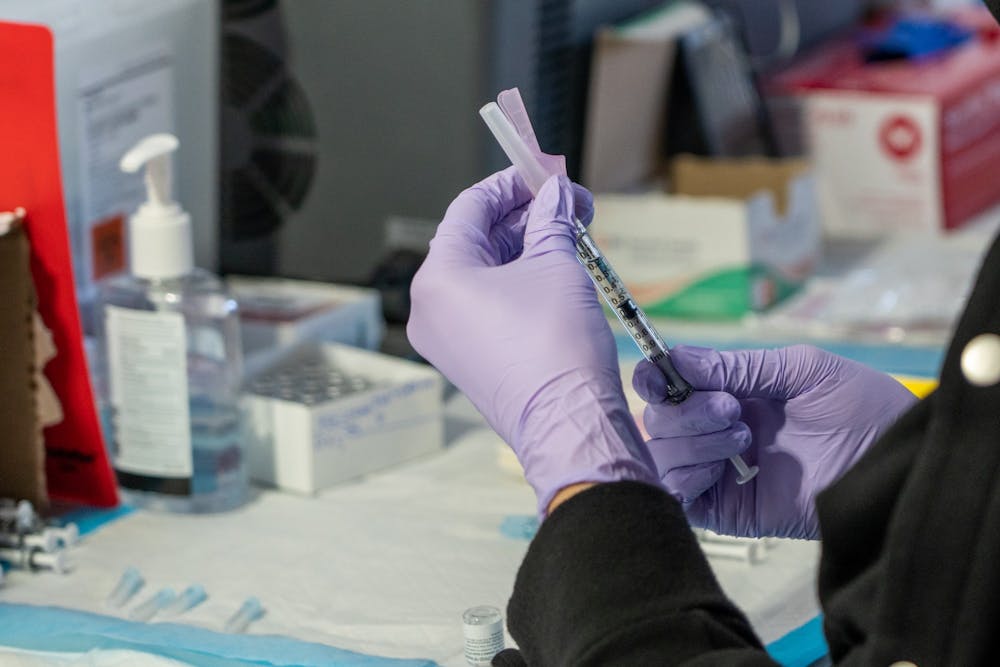All Elon University students are now eligible to receive the COVID-19 vaccine in North Carolina, but the Centers for Disease Control and Prevention advises individuals who receive the vaccine to still follow many of the same guidelines they followed prior to getting their vaccine.
According to the CDC, in public situations, people who are fully vaccinated should still wear a mask and physically distance. One should still avoid medium and large-sized gatherings, and individuals will still be required to wear a mask when using public transportation.
On Elon’s campus, COVID-19 safety precautions are still required, including wearing a mask, physical distancing and limiting capacity in public spaces. According to Ginette Archinal, medical director of student health at Elon, the COVID-19 vaccine is effective in protecting one from getting sick, but vaccinated students should not let their guard down.
“There are no really clear guidelines from the CDC as to how long we can regard somebody as immune,” said Ginette Archinal, medical director of student health at Elon.
Even though vaccinated students should follow guidelines that have been implemented throughout the pandemic, receiving the vaccine gives them a little bit more freedom in how they interact with people.
According to the CDC, when one has been fully vaccinated — meaning it has been two weeks since they received both of their doses of Pfizer or Moderna or the single dose of the Johnson & Johnson vaccine — they can gather indoors with other fully vaccinated people without wearing a mask or maintaining a 6-foot distance. Vaccinated individuals can also visit indoors with low-risk, unvaccinated people from a single household without masks or maintaining a 6-foot distance.
If an individual has been around or exposed to someone who tested positive for COVID-19, they do not need to stay away from other people or get tested unless they start to experience symptoms. In terms of travel, the restrictions are less strict for individuals who are fully vaccinated.
When traveling within the United States, individuals do not need to get tested before or after they travel, and there is no need to quarantine before seeing other people. International travel slightly differs from domestic travel in that one does not need to get tested before leaving the country unless the country they are traveling to requires it. However, people still need to show a negative test or documentation of COVID-19 recovery before boarding the flight back to the United States.
At Elon, students are encouraged to receive the vaccine wherever it is available to them. After students receive one dose of the Johnson & Johnson vaccine or two doses of the Pfizer and Moderna vaccine, they must upload their vaccination documentation to opt out of weekly COVID-19 testing for 90 days. Fully vaccinated students will no longer have to participate in campus testing or quarantine if they were in close contact for 90 days.
Archinal warned that when receiving the Pfizer or Moderna vaccine, it is critical that students receive both doses.
“The first dose does not give you great protection,” Archinal said. “If it did, you wouldn’t need a second dose. If you had your first dose or even if you have had your second dose and you are not at your 14 days, you are still at risk of catching or transmitting the virus.”
Research is still being conducted on the vaccines, and the CDC is still learning about the effects of each vaccine and how they can prevent one from getting severly sick. The Pfizer, Moderna and Johnson & Johnson vaccines are currently effective against SARS-CoV-2 variants, but they might not be as effective against the B.1.1.7, B.1.351, P.1, B.1.427 and B.1.429 variants. As new research and information is released, the CDC will continuously update the public on how to protect and keep their community safe even after receiving the vaccine.


